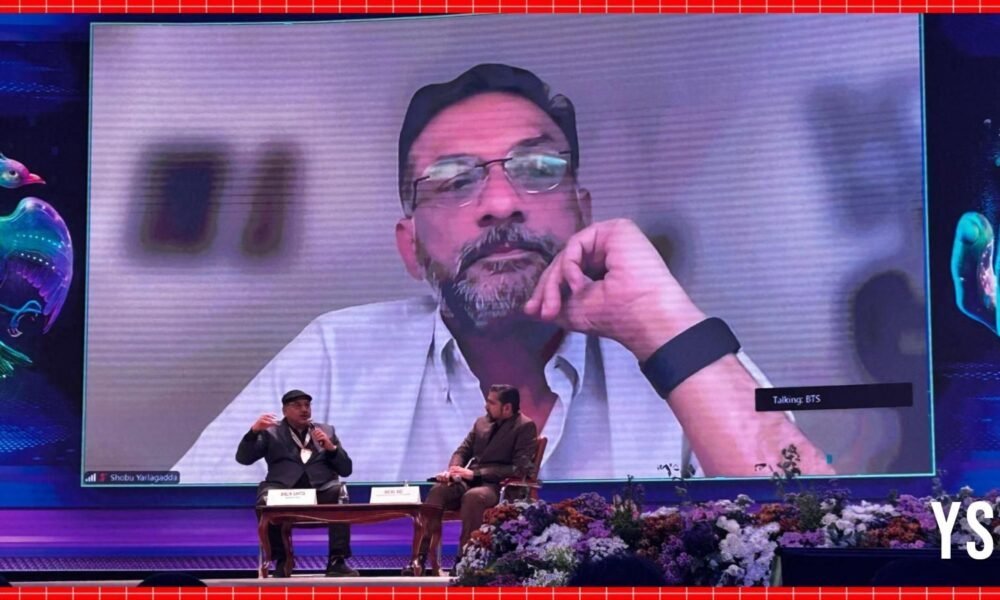Technology shapes creative art forms such as music, film, and animation, notes Indian-American musical composer and environmentalist Ricky Kej, and Shobu Yarlagadda CEO, Arka Media Works.
Music and the way it has been created several changes and it has always depended on how people listen to music. From cassettes and CDs to streaming services such as Spotify and YouTube, the modes of consumption of music have also evolved over the ages, explained Kej.
The panelists Kej and Yarlagadda were speaking at the Bengaluru Tech Summit 2024 on Wednesday in a session ‘Lights, Camera & AI’, which discussed the integration of technology and Artificial Intelligence in the music and film industries. The session was moderated by Biren Ghose, a film producer and Managing Director, Asia Pacific, Technicolor Group.
Kej has won three Grammy Awards and has been nominated for a fourth for his album Break of Dawn at the 67th Annual Grammy Awards. Yarlagadda, a film producer along with Prasad Devineni founded Arka Media Works, a film production company known for its works in Telugu cinema industry.
While on cassettes, the listener would listen to all songs as recorded on it, the latest technology has enabled users to choose what they like to listen to. “Tech is great, it has democratised listening, but the negative is that there are related tracks on the sides so if the first five seconds are not captivating, the listener moves to another song,” Kej added.
As a result, composers create songs that try to grab the attention of listeners in this short span of time. Kej cited the recent song Tauba Tauba as an example of songs with catchy melodies that stay in the minds of the audience. Another trend, he noted, is that no song lasts more than 3-4 months— it trends for some time and another trend then takes over.
Similarly, the film industry has also seen a rapid evolution from heavy cameras to iPhone-shot movies. A common denominator in the two cases is tech adaptation and increased accessibility leading to democratisation of both creations as well as dissemination and consumption.
Before the arrival of modern tools, films were printed and shipped across India and the world in metal trunks and the journey took weeks. However, today, it takes only a click of a button for films to be transferred, which has helped in mass release of content.
“The consumption of content itself has evolved. While earlier it was just the theatres, it has moved to television and mobiles. From appointed viewing to anytime anywhere viewing, and the long-form content has become short-byte content to keep the audience constantly engaged is challenging. We do not have the luxury of time and the 2.5 hours of the film must keep them engaged, else they will quickly move to their mobile phones,” said Yarlagadda, who was a part of the Bahubali film production.
Karnataka is pouring resources into animation and visual effects. According to Ghose, the state has an active centre for excellence for animation visual effects, which is around 6-7 years old. And, the government plans to extend this initiative to four other cities in the state.
“There is a ground swell of talent that is coming from nooks and corners of states of the country and it will make it a great space to be in,” said Ghose. Technicolor Group provides visual effects, motion graphics, and animation services for the entertainment, media, and advertising industries.
“All of us in the industry are dancing at the crossroads of where creativity and technology meet,” he added.
Will AI make humans redundant?
While technology feels overwhelming at times, the differentiating factor will be human creativity and imagination, believes Yarlagadda.
Tracing the journey of technological integration in music, Kej explains that the early 2000s saw the introduction of Virtual Studio Technology Instrument, a plugin that allows for music creation on computers without the need for instrumentalists. “Violins, guitars and orchestra were all available on computers and were so authentic that it was impossible to discern the difference between real violins,” he said.
At the time, the technology sparked debate about whether musicians were needed in studios anymore. “Musicians who thrived brought creativity and improvisations to the table and took it to the next level,” Kej remarked.
Generic music for a horror movie can be AI-generated, but someone like Christopher Nolan in Oppenheimer would try and bring something new, amazing and unique and would require a human composer which will take the genre of music forward, said Kej.
Copyright issues and legal considerations go hand in hand with the integration of AI and technology in any field. This would imply that companies can not use animations of others to train their models but can use their own past ones to help with it, remarked the panellists.
Technology also helps in collaborations with people from across the world. For example, Mufasa the Lion King, which recently had its trailer released, has seen a substantial number of Bengaluru talent in its making, said Ghose.





